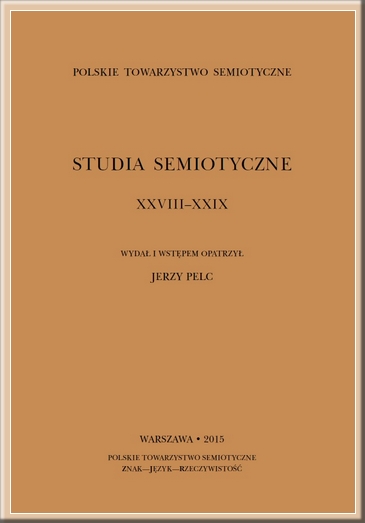Abstrakt
DOI: http://doi.org/10.26333/sts.xxviii.13
Celem artykułu jest propozycja ujednolicenia formalnego opisu procesów poznawczych odbywających się w trakcie dialogu w taki sposób, aby możliwa stała się analiza podobieństw i różnic między tymi procesami. Formalne systemy dialogowe dzielą się na dwie podstawowe klasy czy paradygmaty modelowania komunikacji w zależności od tego, jakiego rodzaju kognitywny proces jest przedmiotem opisu danego systemu. Pierwszy z paradygmatów polega na konstruowaniu zestawu reguł dialogowych na wzór logiki dialogowej Lorenzena (1978), zgodnie z którymi gracze wspólnie dążą do wykazania (dowiedzenia) tautologiczności formuły. W takim przypadku będziemy mówili, że system opisuje dialogi formalne i formalny proces poznawczy polegający na dowodzeniu tautologiczności. W ramach drugiego paradygmatu dąży się do zbudowania systemu, wzorującego się na dialektyce formalnej Hamblina (1970), w którym „symuluje się” rzeczywistą praktykę komunikacyjną. W dialogach opisywanych przez te systemy, gracze przeprowadzają poprawną argumentację, tzn. argumentację, która spełnia określone postulaty racjonalności jak np. nie popełnianie błędnego koła w uzasadnianiu. W takim przypadku będziemy mówili o naturalnym dialogu i o naturalnym poznawczym procesie argumentacji.
Bibliografia
Alama Jesse, Sara L. Uckelman. 2011. Lorenzen dialogue games as logical semantics W Internatinal colloquium. Inside arguments: Logic vs Argumentation theory, 1-14. Faculty of Letters of the University of Coimbra.
Bench-Capon Trevor J. 1998. "Specification and implementation of Toulmin dialogue game". Proceedings of JURIX 98 : 5–20.
Blackburn Patrick. 2001. "Modal logic as dialogical logic". Synthese 127 : 57–93.
Blass Andreas. 1992. "A game semantics for linear logic”. Annals of Pure and Applied Logic 56 : 183–220.
Budzyńska Katarzyna. 2013. "Retoryczne strategie poznawcze". Przegląd Filozoficzny – Nowa Seria 22 (2) : 253-274.
Budzyńska Katarzyna, Chris Reed. 2016. "Znaki dyskursywne jako źródło i manifestacja inferencyjnych procesów poznawczych". Studia Semiotyczne XXVIII–XXIX : 173–193.
Eemeren Frans H. van, Rob Grootendorst. 1992. Argumentation, Communication, and Fallacies: A Pragma-Dialectical Perspective. Hillsdale: Lawrence Erlbaum Associates.
Hamblin Charles Leonard. 1970. Fallacies. London: Methuen.
Hansen Hans V., Robert C. Pinto (red.). 1995. Fallacies: Classical and Contemporary Readings. University Park, PA: Pennsylvania State University Press.
Hodges Wilfred. 2009. "Logic and Games". W The Stanford Encyclopedia of Philosophy, E. N. Zalta (red.). http://plato.stanford.edu/entries/logic-games/
Hołówka Teresa. 1998. Błędy, spory, argumenty. Szkice z logiki stosowanej. Warszawa: Wydział Filozofii i Socjologii UW.
Koszowy Marcin. 2013. "A Methodological Approach to Argument Evaluation: Rules of Defining as Applied in Assessing Arguments". Filozofia Nauki 1 (81) : 23–36.
Koszowy Marcin, Katarzyna Budzyńska, Olena Yaskorska. 2013. "Kryteria poprawności technik komunikacyjno-poznawczych". Zagadnienia Naukoznawstwa 2 (196) : 145–172.
Lorenz Konrad. 1987. Logika dialogowa. W Logika formalna: zarys encyklopedyczny z zastosowaniem do informatyki i lingwistyki, W. Marciszewski (red.), 83–91. Warszawa: PWN.
Lorenz Konrad, Paul Lorenzen. 1978. Dialogische Logik. Darmstadt: Wissenschaftliche Buchgesellschaft.
Mackenzie Jim D. 1979. "Question begging in non-cumulative systems". Journal of Philosophical Logic 8 : 117–133.
Prakken Henry. 2006. "Formal systems for persuasion dialogue". Knowledge Engineering Review 21 : 163–188.
Rahman Shahid, Laurent Keiff. 2004. On how to be a dialogician. W Logic, Thought and Action, D. Vanderveken (red.), 359–408. Dordrecht: Kluwer.
Rahman Shahid, Matthias Fishmann, Helge Rueckert. 1997. "On Dialogues and Ontology. The Dialogical Approach to Free Logic". Logique et Analyse 160 : 357–374.
Reed Chris, Douglas Walton. 2007. "Argumentation schemes in dialogue". W Diessensus and the Search of Common Ground (Proceedings of OSSA 2007), H. V. Hansen et al. (red.). Windsor, Ontario: University of Windsor.
Tokarz Marek. 2006. Argumentacja. Perswazja. Manipulacja. Wykłady z teorii komunikacji. Gdańsk: Gdańskie Wydawnictwo Psychologiczne.
Walton Douglas. 1995. A Pragmatic Theory of Fallacy. Tuscaloosa–London: The University of Alabama Press.
Walton Douglas. 1999. "The Fallacy of Many Questions: On the Notions of Complexity, Loadedness and Unfair Entrapment in Interrogative Theory.” Argumentation 13 : 379–383.
Walton Douglas N., Lynn M. Batten. 1984. "Games, graphs and circular arguments". Logique et Analyse 106 : 133-64.
Walton Douglas N., Erik C. W. Krabbe. 1995. "Commitment in Dialogue". Series in Logic and Language. State University of New York Press.
Woods John, Douglas N. Walton. 1978. "Arresting circles in formal dialogues". Journal of Philosophical Logic 7 : 73–90.
Woods John, Douglas N. Walton. 1989. Fallacies. Selected Papers 1972–1982. Dordrecht-Providence-Berlin: Foris Publications-Mouton de Gruyter.
Yaskorska Olena, Katarzyna Budzyńska. 2014. "Akty komunikacyjne w dialogach formalnych, (Communication Acts in Formal Dialogues)”. Filozofia Nauki 3 (87) : 43–66.


